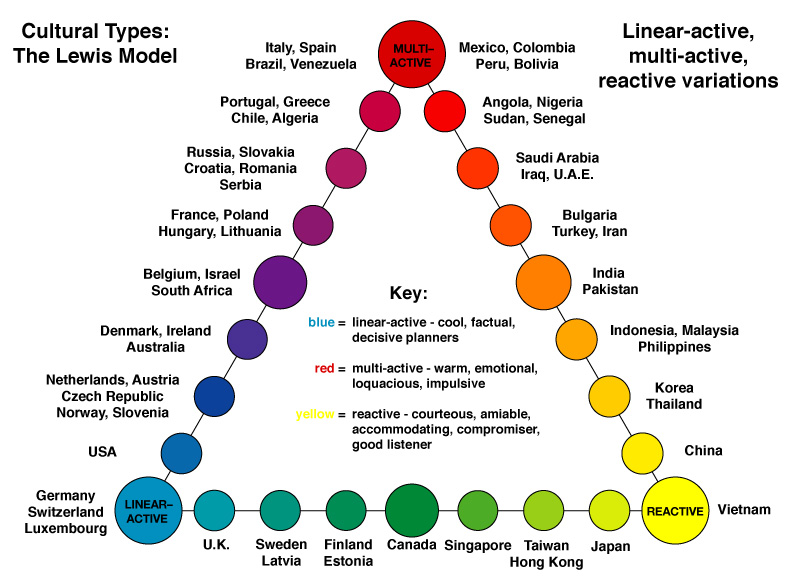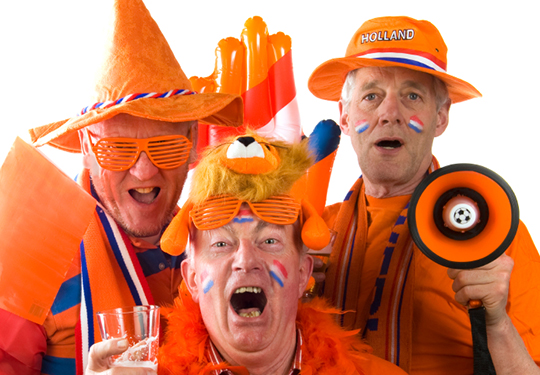On April 30 or ‘Queen’s day’, Queen Beatrix abdicated in favour of her son Willem-Alexander. And although the entire nation went slightly crazy – painting itself and everything within sight in the brightest orange available, the Dutch motto when doing business is: “Act normal – that’s crazy enough”.
Even if it is not said out loud, it is always top of mind for the Dutch. Appreciate its importance and doing business with the Dutch will be much easier. Here are a few other things you should know about doing business in The Netherlands:
‘Linear-active’ is the way to go
In 2002 our new King Willem-Alexander married his Argentinian wife, Princess Màxima, who stems from a Catholic family.
At first glance there may seem nothing too extraordinary about this match. However, only 50 years ago in 1964 Princess Irene, sister of our now Princess Beatrix, caused quite a stir when she secretly turned Catholic and later that year married a Catholic: Carlos Hugo de Bourbon Parma (a disputed heir to the Spanish throne).
Part of the Protestant population of The Netherlands was not amused, to say the least, about Princess Irene’s conversion. This was one of the reasons (the political sensitivity of the groom’s position another) why her mother Queen Juliana could not attend the wedding in Rome. Nor could her father and sisters for that matter. The wedding also had to take place outside The Netherlands because of the sensitive nature of this liaison.
Why was this sensitive in The Netherlands at the time? To truly understand a big part of the Dutch mindset it is important to realise that the Kingdom of The Netherlands has its roots in the Reformation, and the liberation from the Spanish King Fillip II who had many people in The Netherlands persecuted, tortured and killed for the sole reason of turning Protestant.
The division between Catholics and Protestants is one of the reasons why The Netherlands and Belgium did not manage to stay united and became two independent nations in 1839.
Even though the division over religion is no longer strongly felt in The Netherlands, it is not that long ago that it would have been unthinkable for our at the time still Crown Prince Willem-Alexander to marry a Catholic lady, which Princess Màxima remains today. Their wedding service may have been a Protestant one, their three daughters may have been baptized in a Protestant Church; Princess Màxima still is of Catholic faith.
The Reformation, initiated by Calvin and Luther, strongly influenced the mindset of the Dutch, including the many Catholic people living mainly in the south of The Netherlands. It is from Calvin’s ideas that the Dutch love for “Act normal that’s crazy enough” stems.
How will this affect your doing business in The Netherlands? Looking at the Lewis model with its three cultural categories, we find The Netherlands in the linear-active category, together with many other countries that show strong Protestant influences.
They will interrupt you. Often.
The Dutch habit to often interrupt their interlocutors is a multi-active trait that takes them up a little in the Lewis model towards the multi-active category.

“Two hundred years free and united by equal rights and duties”
The Dutch feel everyone should have equal rights (and duties!).
As a result Dutch organisations tend to be flat, with leadership based on merit, competence and achievements. For those stemming from more hierarchical cultures it is sometimes difficult to see who is boss in a Dutch company as authority may be disguised. In The Netherlands, equality also leads to managers consulting their subordinates in long debates seeking seemingly mandatory consensus.
These so-called ‘Dutch debates’ understandably frustrate foreigners used to quick decision-making processes with a strong leader in charge. The upside to these long consultation rounds is that once consensus is achieved plans will be implemented fairly quickly and with little resistance throughout the rank and file. Behaving like a strong boss may cause other members of staff to think “Act normal that’s crazy enough”.
“Act normal that’s crazy enough” means a dislike for pretentiousness and grandiose. This dislike for the grandiose may be difficult to get to terms with if you are French (who tend to love grandiose) and you find yourself enduring a ‘working lunch’ with rolls brought into the meeting room together with milk (very Dutch) and orange juice so the meeting will not be interfered with too much.
Three hour luncheons are exceptional in The Netherlands; it is considered a waste of time and money. The latter also accounts for a lack of expensive company cars, which are generally frowned upon because it is not seen as “acting normal”. This attitude explains the Dutch image of frugality or even stinginess.
Another important Dutch value is truth-telling. As Fons Trompenaars, Dutch himself, explains in his books on cross-cultural communication Universalists reason: “What is good and right can be defined and always applies”.
According to Trompenaars this originates from Protestants relating to God through the Bible; The Lord’s written word on earth. For Protestant believers there is no intermediate between God and His people, therefore they need to rely on the Bible to understand what is right and what is wrong. This still influences the generally Universalist Dutch in being a law-abiding people.
Take the law seriously, because the Dutch do
The law is another form of written rules and regulations that need to be taken seriously. The Dutch therefore highly value written contracts, although the system of Dutch law does not require lengthy contracts, like Anglo-American companies tend to draw up. The Dutch love for truth-telling, together with a desire to avoid uncertainty, explains their direct style of communication. They say what they think, what they believe is right or wrong, often unasked for and in clear words, thus coming across as opinionated or rude.
After living in the UK for several years I understand this attitude may cause offence to others who value maintaining face. The understanding of face, a value mainly found in the third category in the Lewis-model; the reactive cultures, is an important value for the British as well. The positive thing about this directness is that with the Dutch you will rarely have to guess where they stand. This is likely to make the process of negotiating business deals easier.
The Dutch are also not easily shocked or offended by your opinions as they separate the opinion from its giver. Keep in mind another Dutch value is that we are all free to say what we think. This freedom is more important than social niceties like being polite as the Dutch’ ancestors truly had to fight for their freedom of religion. Beating around the bush or over-carefully sharing your opinion also may be seen as the opposite from “act normal that’s crazy enough”.
Don’t be loud, fast or ill-informed
Approaching the end of this article I will give you some tips on presenting your company or services to a Dutch audience:
- Arriving and starting on time tells them they can trust you
- They dislike loud and fast presentations
- They need fact-based information
- The speaker needs to be well-informed, well-prepared and competent as your name and charisma are not enough to convince them
- Do not waste their time, as they have “other things to see to”
Bearing these points in mind, especially number 2 will help you avoid clashing with “act normal that’s crazy enough”. Do not take such a clash lightly; “not acting normal” will influence negatively your credibility in their eyes. If you do not manage to gain credibility you may lose the business deal before you have even got it.
With this article I tried to shed some light on a couple of truly important Dutch values. The values of equality and truth-telling you will no doubt encounter quickly when dealing with the Dutch. Of course there is much more to say about the Dutch and not every Dutch man or woman fits this generalized picture.
You may have seen some footage of the celebrations of the investiture (indeed: investiture, not a coronation) of King Willem-Alexander on April 30th. You will get a glimpse of the Dutch breaching their “act normal that’s crazy enough” rule as they are dressed in orange, wearing silly orange hats and facial decorations as they do on King’s day, formerly Queen’s day, and when the national football team are playing.

The ceremony itself on the other hand was executed in a sober manner and therefore adhered to “act normal that’s crazy enough”. You may also have seen how close the Dutch Royal Family actually are to their people, as they are approachable (read: equal) when appearing in public.
Find Marianne Mol on Twitter, LinkedIn and Whiteboardmag.
Post Tags: Tags: business, doing, Dutch, linear-active
